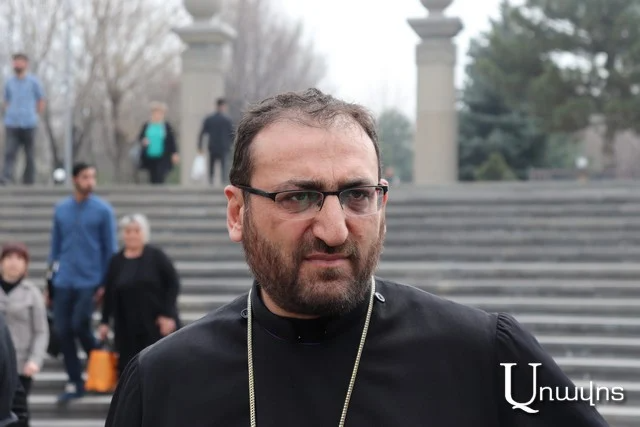In response to a reporter’s question about how our authorities are outlining their attitude towards Turkey by saying that we should no longer consider Turkey as an enemy state even though Turkey was directly involved in the 2020 Artsakh War, and is it so easy to truly forget all of that, Bishop Arshak Khachatryan said, “I would refrain from using emotional vocabulary in relationships such as ‘enemy’ or ‘ally.’ There are objective situations in international relations.
It is understandable in this situation that we cannot consider the relations we have with Turkey and Azerbaijan to be friendly. We are in an objective situation. The war ended a few months ago, and we have many casualties and lost territories as a result of that war, and our emotions are very high at this time. Based on that, I do not think that it is objective to make such statements.”
Upon the observation that it is a Christian teaching that you must love your brother as yourself and you must avoid creating hatred, so is it truly wrong to say that we shouldn’t be enemies with Turkey considering that, Bishop Arshak said, “In the general Christian morality, the image of the enemy and the friend is often distorted during certain presentations. When we talk about the image of the enemy and the need to love the enemy, it does not mean that we are talking about subordinating our values and our worship towards God to the inclinations and ambitions of that enemy. The most classic example is given by one of the fathers of our Christian church: the devil is our enemy, does that mean we should love the devil? Essentially, we need to describe what love is. To love your enemy does not mean to put up with your enemy’s sense of understanding and demands. To love your enemy means to make an effort to strengthen your enemy’s Christian feelings. In this sense, love does not mean to submit or be enslaved. Our obedience is voluntary Christian obedience. Forced obedience is submission, which is alien to the Christian spirit.”
When asked if the biblical passage about how you should turn the other cheek when someone slaps you means that people should not butcher their enemy, Bishop Arshak said, “You know, it is also important to mention whom this is aimed towards. Not only does the person who was slapped need to feel that way, but also the person doing the slapping. You must always think about how you aren’t in the position that is getting slap, but also in the position that is doing the slapping. There is nothing written about slapping? It is not acceptable to hit someone, right? We should simply not accept someone who accepts being slapped.”
Read also
Azerbaijanis are committing acts of vandalism and destroying Armenian churches. Regarding this, Bishop Arshak said, “It is not unexpected, to be honest. We are familiar with the state policy of Azerbaijan. The destruction of the khachkars in Nakhichevan is one of the most striking examples of this. The Mother See is trying to obtain certain security guarantees with the involvement of various international organizations for the preservation of historical and cultural monuments. But it is difficult to assess how effective this will be. In any case, we must try our best, but our sanctuaries and historical and cultural monuments are in great danger.”
Hripsime Jebejyan






















































